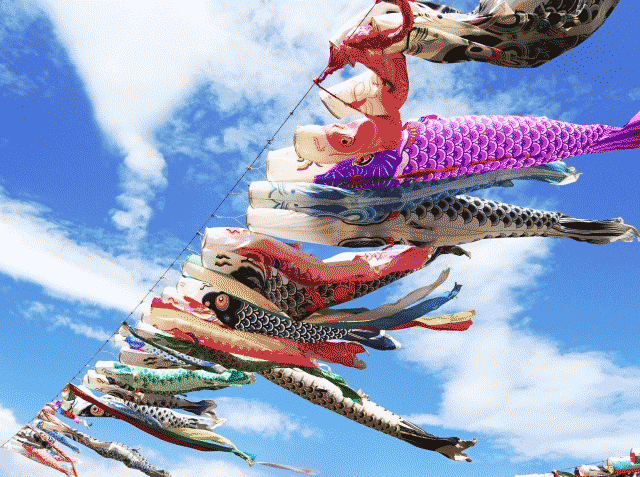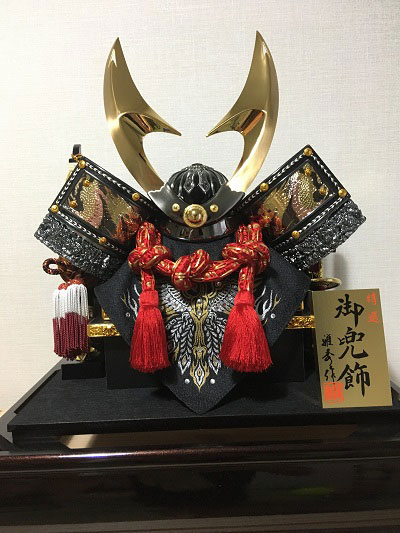News
May – Kodomo-no-Hi Updated in May 2018
Kodomo-no-Hi or Children’s Day in Japan falls on May 5 every year. People wish for the well-being of their children. It is also an occasion to celebrate the prosperity of young boys, just like Hinamatsuri or Girls’ Day on March 3.
The custom to ward off sickness during the month of May (lunar calendar) originated in China because many people used to die from seasonal epidemic diseases. To repel evil, plants with medicinal properties like iris and wormwood were decorated at the entrance of each home. This custom came to Japan during the 8th century as an occasion to ward off sickness for the whole family, particularly children. Reflecting this ritual, Japanese people started to put iris leaves in hot bath water to improve blood circulation.
After the 13th century, this custom spread among the bushi or warrior class and doubled as a celebration for boys born into bushi families. Families with boys would display traditional dolls wearing armored costumes, so that the dolls would suffer danger in place of the young boy. Also, kashiwa-mochi, a special type of sweet soft rice-cake wrapped in oak leaves are widely eaten at this time of year, because oak leaves never fall off before the buds mature. It implied that the family line would never be broken. After World War II, the Japanese government specified May 5 to be a holiday for all children including boys and girls. On May 5, many parks, museums and tourist attractions around Japan admit visitors free of charge.
At this time of year, you might also see many fish-shaped wind streamers in the air. They are supposed to resemble swimming carps. These streamers are hung outside the home, in large parks and school yards. Because carps swim up against the current, they symbolize the future success of young children against challenging circumstances. As the family grows, more number of baby carps would be added to the collection. This month we introduce you to some events related to Kodomo-no-Hi.


-
Bishamon Matsuri & Nakizumo Taikai
A baby sumo match! Shinto priests will hold babies of 6-18 months old face to face on a sumo wrestling stage, bringing the two babies closer and closer. The one who cries out first would lose the match.
Date: May 3-May 5, 2018Place: Narushima Mikumano Jinja-Inside Bishamondo
Address: 5-1 Towa-cho, Kita-Narushima, Hanamaki-shi, Iwate-ken
Access: Get off at Tsuchizawa station on JR Kamaishi Line; Take Hanamaki city bus and get off at busstop Bishamon
https://www.kanko-hanamaki.ne.jp/en/festivals/index.html
https://www.kanko-hanamaki.ne.jp/event/event_detail.php?id=32 Kodomo Kiba Musha Gyoretsu-Children Parading on Horseback
In this parade, both adults and children dressed up in warrior costumes would parade on horseback. The parade can be traced back to the brave mid-11th century hero Minamoto-no-Yoriyoshi. The spectacular armors and full warrior costumes for young boys and girls were handmade by a local artist. The 400-meter procession commemorates the arrival of spring in northern Japan and celebrates the prosperous growth of children. The event is hosted by the local shrine Komagata Jinja.
Date: May 3, 2018 Time: 15:00
Place: Procession leaves Komagata Jinja at 15:00 and parades around city streets
Address: 1-83 Naka Uwano-cho, Mizusawa-ku, Oshu-shi, Iwate-ken-next to Mizusawa Park
Access: 10-minute walk from JR Mizusawa station to Komagata Jinja
http://komagata.iwate.jp/about/access.html-
Hamamatsu Matsuri
Participants fly gigantic kites to wish prosperous growth of newborns babies. Some kites measure up to 3 meters. Besides the ritualistic kite-flying, the spectacular fight to break the opponent’s kite string by hooking your string on purpose is worth watching. Even if you miss the kite competition, you can still enjoy relaxed festive moods in the evening parade.
Date: May 3 – May 5, 2018
Place: Nakatajima Sand Dune kite flying venue, Hamamatsu-shi, Shizuoka-ken
Access: Take shuttle bus from JR/Meitesu Hamamatsu station; the bus stops at Nakatajima Sakyu Iriguchi (Nakatajima Dune Entrance) intersection and you will be prompted to walk 10 minutes to the kite flying site.
https://www.japan.travel/en/spot/2043/
https://hamamatsu-daisuki.net/matsuri/
Kodomo-no-Hi Manyo Gagaku-kai Performance
Gagaku includes classic court music and dance. The performance takes place on a floating stage built over a lake at the Manyo Botanical Garden. Viewing the graceful movements by the young performers with blooming Wisteria flowers in the background, will take you back to ancient Japan. The grand shrine Kasuga Taisha is one of the historic monuments of ancient Nara.
Date: May 5 Time:13:00
Place: Kasuga Taisha Manyo Botanical Garden (Open 9:00-16:30)
Address: 160 Kasugano-cho, Nara-shi, Nara-ken
Access: From Nara station, take Nara Kotsu Bus and get off at “Kasuga Taisha Honden”
https://www.kunaicho.go.jp/e-culture/gagaku.html
https://www.visitnara.jp/venues/E02036/
https://en.japantravel.com/nara/manyo-botanical-garden/12990
-
Hana-Matsuri (Saga)
A flower festival held at a nationally registered memorial site:
Time: March 16-April 8
Place: Mifuneyama Rakuen Park
Address: 4100 Takeo, Takeo-cho, Takeo-shi, Saga-ken
Access: 5-minute bus ride from JR Takeo Onsen station; get off at Mifuneyama Rakuen bus stophttps://www.mifuneyamarakuen.jp/early_spring/
https://www.facebook.com/mifuneyamarakuen







